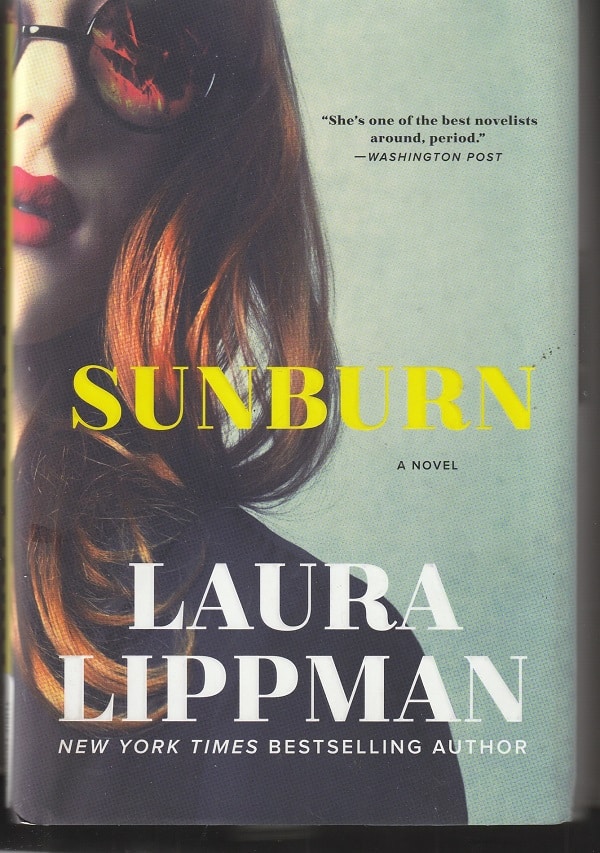Laura Lippman’s 2018 novel Sunburn is a mystery and a crime novel, but it’s more of a character study.
The characters are Adam Bosk and Pauline Hansen, once known as Pauline “Polly” Costello and Pauline Ditmars and Pauline Smith and now going by Polly Costello. The story take place, for the most part, in Belleville, Delaware, and opens on June 11, 1995. There is a seven-page epilogue in Baltimore, set in 2017.
Adam is a Baltimore-based, good-looking, highly competent private investigator who has been hired to get close to Polly and her husband Greg Hansen in order to find out if she has a large chunk of money, “millions,” hidden away.
His client is Irving Lowenstein, a sleazy insurance broker who doesn’t think of himself as particularly sleazy even if he’s had a lot to do with a bunch of fatal fires that were set by Polly’s late first husband Burton Ditmars, a dirty Baltimore arson investigator.
Adam and Polly meet cute, in a crime novel sort of way, as two people who seem to just bump into each other at the bar of the High-Ho restaurant in Belleville.
High-Ho. A misprint? Was it supposed to be Heigh-Ho? And if so, was it for the seven dwarfs, heading home from the mines at day’s end, or for the Lone Ranger, riding off into the sunset? Neither makes much sense for this place.
At least, that’s what Adam thinks between scoping out Polly.
It’s the sunburned shoulders that get him. Pink, peeling. The burn is two days old, he gauges. Earned on Friday, painful to the touch yesterday, today an itchy soreness that’s hard not to keep fingering.

It was a rookie mistake, that sunburn. But why would a redhead in her thirties make such a mistake? And, for that matter, why was the woman in this podunk town forty-five miles inland from the Atlantic beaches?
Secrets
Both Adam and Polly have secrets. Sunburn is a mystery, after all.
Adam, of course, didn’t just happen into the bar. He’s tracked Polly here after she walked away from her husband and three-year-old daughter Lani and hitchhiked into the ether. He’s being paid by Irving with expenses covered, and the plan hasn’t changed even if Polly’s circumstances have.
The idea is to get so friendly with her that, at some point, she’ll spill the beans about the big heap of money that Irving is sure she has squirreled away somewhere. So, Adam stays in Belleville when Polly decides to stay there.
He gets a job as a cook at the High-Ho after Polly is hired as a waitress there and reports back to Irving that he has nothing to report.
Although Adam knows a lot about Polly that she doesn’t know he knows, she’s still a bundle of enigmas to him. Her stop in Belleville was happenstance, and she’s planning soon to head west to find what she expects will be some kind of financial security.
For obvious reasons, the two are, at first, standoffish. Then, they are somewhat friendly. Then — this is a mystery, after all — they become lovers. But lovers who are constantly in a dance clouded by secrecy and mystery. That seems to be a turn-on for both of them.
Like P.D. James
In some ways, Lippman’s Sunburn is reminiscent of the mystery-crime novels of P.D. James. There is a lot more going on than the mechanics of crime-detection-solution.
There is often the sense, when reading a James novel, that she’s channeling Jane Austen. Her characters are much more complex than a mystery plot would require. James is more interested in the inner thoughts and feelings of the people in her novels than in investigative procedures (although she writes about those with great accuracy).
Lippman, who, like James, writes well, is aiming to hit the same notes. I don’t think she’s fully successful. The mystery plot aspect of the novel seems a bit flaccid, perhaps because Lippman is more focused on the foibles and quirks of her central characters. At the same time, the overcomplicated plot is a distraction from her look at Adam and Polly as fully fleshed people.
There are a lot of crimes that are part of the plot. There is a death in the middle of the book that could be a murder but might be a misfired assassination. Lippman provides a nice twist at the end of the book.
Nonetheless, Sunburn awkwardly straddles the two genres of mystery and character study in a way that left me somewhat dissatisfied.
Patrick T. Reardon
10.19.23
Written by : Patrick T. Reardon
For more than three decades Patrick T. Reardon was an urban affairs writer, a feature writer, a columnist, and an editor for the Chicago Tribune. In 2000 he was one of a team of 50 staff members who won a Pulitzer Prize for explanatory reporting. Now a freelance writer and poet, he has contributed chapters to several books and is the author of Faith Stripped to Its Essence. His website is https://patricktreardon.com/.
